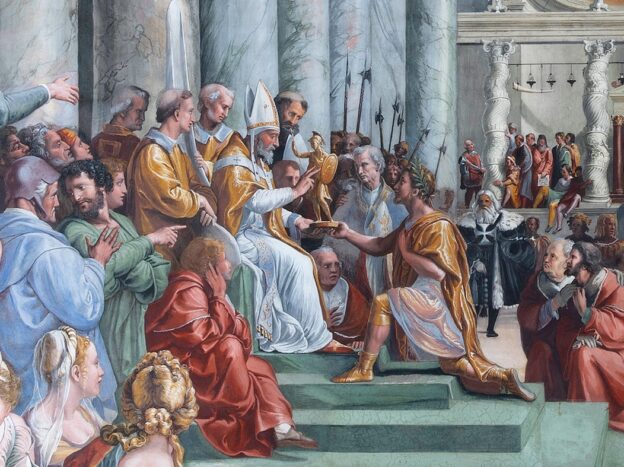This article explores Dante’s political treatise De Monarchia, in which he argues for a divinely ordained universal empire distinct from the Church. Combining Roman law, Aristotelian philosophy, and Thomistic theology, Dante envisions imperial rule as the necessary foundation for peace, justice, and the fulfilment of humanity’s earthly potential.
Introduction: Politics as Theology
To most readers, Dante Alighieri is the poet of the afterlife, author of The Divine Comedy, a sweeping vision of Hell, Purgatory, and Paradise. Yet Dante was also a political philosopher of rare rigour and intensity. In his lesser-known Latin treatise De Monarchia (On Monarchy), Dante sets out a radical, even visionary argument: that universal peace and justice can only be secured through a single, divinely sanctioned, world-embracing Empire, led not by the Church, but by a secular monarch.
Written during his exile from Florence, De Monarchia is both a work of political idealism and a critique of the chaos of Dante’s time, an Italy riven by faction, papal overreach, and endless war. At its heart lies a simple but audacious proposition: that the Emperor and the Pope should be independent, each deriving authority directly from God, and each sovereign in their own sphere.
In this article, we explore De Monarchia as a work of Christian political theology, shaped by Roman law, Aristotelian logic, and Dante’s longing for order in a disordered world.
Dante’s Political Context: Faction, Papacy, and Imperial Decline
Dante wrote De Monarchia in the early 14th century, amid the long decline of the Holy Roman Empire and the growing temporal ambitions of the papacy. Italy, his homeland, was fractured between Guelphs and Ghibellines, supporters of papal and imperial power respectively, while cities like Florence were torn apart by internal feuds, corruption, and violent instability.
Dante had once held public office in Florence, aligning with the White Guelphs, who sought independence from both Pope and Empire. But after Boniface VIII’s intervention and Dante’s subsequent exile, he grew deeply disillusioned with the papacy’s worldly ambitions. In De Monarchia, he sets out to offer not a partisan tract, but a comprehensive theological and rational justification for imperial authority as the keystone of peace and justice.
The Three Books of De Monarchia
Dante structures De Monarchia in three books, each answering a central political-theological question:
Book I: Is Monarchy Necessary for the Good of Humankind?
Dante answers yes. Drawing on Aristotle’s Politics, he argues that human beings are social and rational creatures, best governed by a universal authority that fosters unity, peace, and justice. Just as the heavens are ruled by one God, so too should the temporal realm be ruled by one monarch.
Division and conflict arise, Dante claims, not from power itself, but from competing powers. A single sovereign, placed over all, would have no rivals and thus no incentive toward tyranny. He could rule impartially, promote virtue, and uphold the common good.
Book II: Was the Roman Empire Legitimately Ordained by God?
Here, Dante asserts that the Roman Empire was not only legitimate, but divinely instituted. He offers a theological reading of Roman history, seeing figures like Julius Caesar and Augustus as providential agents preparing the way for Christ.
Dante even claims that the crucifixion of Jesus under Roman authority was a sign of that Empire’s universal jurisdiction, if Christ accepted its judgment, it must have held divine legitimacy. For Dante, Roman imperium was not superseded by Christianity, but fulfilled through it.
Book III: Does the Emperor Derive Authority Directly from God, or through the Pope?
This is the heart of Dante’s challenge to papal supremacy. He argues that the Emperor’s authority comes directly from God, not through the mediation of the Pope. The spiritual and temporal realms are distinct but ordered toward the same divine end.
Dante draws on the metaphor of the “two suns”, Church and Empire, each giving light in its own domain. To subordinate one to the other is to distort divine harmony. The Pope’s attempt to wield both swords (spiritual and temporal) is, for Dante, a violation of divine order.
Empire as Peace, not Tyranny
To modern readers, Dante’s monarchism may sound authoritarian. But his ideal monarch is not a despot. He is a rational, virtuous, and just ruler, closer to Aquinas’ model of kingship than to Machiavellian realpolitik. The true monarch serves not his own will, but the common good, fostering peace, stability, and spiritual flourishing.
For Dante, only a universal authority, free from local ambition and clerical interference, can provide the conditions under which human beings can fulfil their telos: to live according to reason and in pursuit of eternal truth.
De Monarchia and The Divine Comedy: Parallel Visions
De Monarchia is not a political appendix to The Divine Comedy, it is a companion piece. The vision of justice in Inferno, the purification in Purgatorio, and the harmony of Paradiso all rest on the belief that order, rightly understood, reflects divine will.
In Paradiso VI, the soul of the Emperor Justinian speaks at length on the history and majesty of Rome, reinforcing the spiritual grandeur of imperial authority. And throughout the Comedy, the Church is criticised not for being spiritual, but for becoming worldly, for abandoning its Petrine mission in favour of Caesar’s throne.
The Comedy gives us the poetic cosmos of sin and salvation. De Monarchia gives us the terrestrial order that ought to undergird it.
Conclusion: Dante’s Hope for a Redeemed Order
Dante’s De Monarchia is more than a defence of Empire. It is a lament for the lost unity of Christendom and a prophetic call for a future where justice, reason, and peace prevail. It is not nostalgia for Rome alone, but a theological longing for concordia, the harmony of Church and Empire under God.
He died in exile, his political hopes unrealised. But the vision endured. And in our fractured world of clashing sovereignties, Dante’s voice still speaks, calling not for domination, but for divine order rightly restored.
